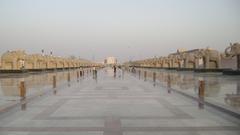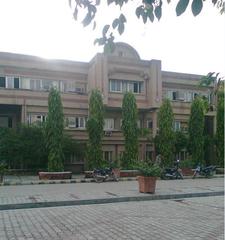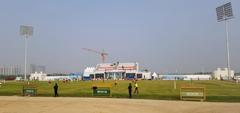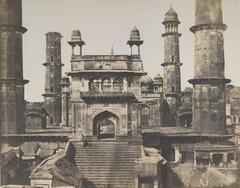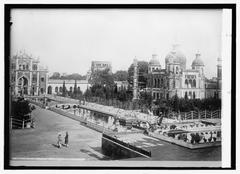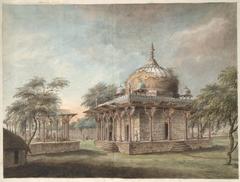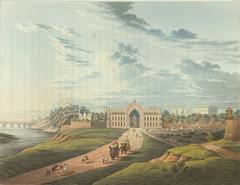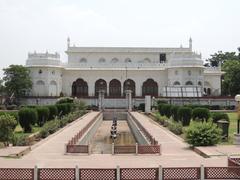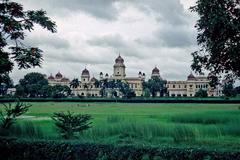
Lucknow Air Force Station: Visiting Hours, Access, and Historical Significance
Date: 03/07/2025
Introduction
Lucknow Air Force Station—commonly referred to as Bakshi Ka Talab Air Force Station (BKT)—is a strategically significant military base situated on the northern outskirts of Lucknow, Uttar Pradesh, India. Established during the British colonial era and now operated under the Indian Air Force’s Central Air Command, BKT is a cornerstone of India’s air defense network. While direct public access is strictly prohibited due to its military status, this article provides a comprehensive overview of its historical evolution, operational role, protocols for any potential visits, and suggestions for exploring the rich historical and cultural attractions of Lucknow. For further research, readers are encouraged to refer to resources such as Bharatpedia and DBpedia.
Table of Contents
- Overview and Strategic Importance
- Historical Evolution
- Units, Aircraft, and Infrastructure
- Visitor Access, Protocols, and FAQs
- Top Nearby Attractions in Lucknow
- Practical Travel Tips
- Visual and Media Resources
- Conclusion
- References and Further Reading
Overview and Strategic Importance
Lucknow Air Force Station is a vital node in India’s defense grid. Known for housing No. 35 Squadron “Rapiers”—a unit renowned for electronic warfare and air superiority—the station supports a variety of operational roles, including rapid response, air defense, and surveillance across northern and central India. Given its military function, access is tightly controlled, and the base is not open for routine tourism or casual visits.
Historical Evolution
British Era Origins
The airbase’s origins date back to the pre-World War II period, when the British administration recognized the strategic necessity of an airstrip in northern India. The Bakshi Ka Talab airstrip, constructed about 1.5 km from the main Bakshi Ka Talab road, served as an emergency landing and supply hub during World War II. Its role was pivotal in reconnaissance and support missions (Bharatpedia; DBpedia).
Post-Independence Development
Following Indian independence in 1947, the airstrip was modernized and integrated into the Indian Air Force’s infrastructure under Central Air Command. Over the decades, it has grown in both capability and operational significance—now equipped to support advanced fighter jets, transport aircraft, and electronic warfare platforms.
No. 35 Squadron: The “Rapiers”
No. 35 Squadron, known as the “Rapiers,” is based at BKT. The squadron is tasked with air defense and electronic warfare missions, operating a mix of aircraft and supporting the IAF’s rapid response and surveillance missions throughout the region.
Units, Aircraft, and Infrastructure
Major Units
- No. 35 Squadron “Rapiers”: Specializing in air defense and electronic warfare.
- Air Defence and Surveillance: Advanced radar and reconnaissance teams.
- Support and Training: Maintenance wings, logistics, and technical training units.
Aircraft Operated
- Fighter Jets: Sukhoi Su-30MKI (rotationally), MiG-21 Bison (limited/training roles).
- Transport: Antonov An-32 for logistics and troop movement.
- Helicopters: HAL Chetak, Cheetah for search & rescue and liaison.
- UAVs: For real-time surveillance and disaster response.
For detailed specifications and aircraft histories, review the IAF Aircraft Database.
Base Facilities
- Runway: Reinforced, all-weather, with advanced navigation aids.
- Hangars & Maintenance: Capable of major overhauls for fixed- and rotary-wing aircraft.
- Control & Operations: Modern air traffic and command centers.
- Security: Comprehensive fencing, surveillance, and patrol protocols.
- Amenities: Housing, messes, recreation, sports, and emergency services.
Visitor Access, Protocols, and FAQs
Public Access and Ticketing
- No General Public Entry: Lucknow Air Force Station is a restricted military area; there are no public visiting hours or ticketed tours.
- Special Events: Occasionally, the IAF may host ceremonial or educational events by invitation only. These are rare and require advance security clearance.
- Photography: Strictly prohibited unless officially permitted.
Official Protocols for Authorized Visitors
If granted special access (such as for official delegations or dignitaries):
- Carry valid government-issued ID.
- Submit to security checks and follow all instructions.
- Remain within designated visitor zones.
- Adhere to prohibitions on photography, electronic devices, and restricted items.
Foreign nationals require high-level government clearance, which is rarely granted.
Frequently Asked Questions (FAQs)
Q1: Can I visit Lucknow Air Force Station?
A: No, the airbase is closed to the public.
Q2: Are there general visiting hours or tickets?
A: No, neither are available due to security protocols.
Q3: Are there guided tours?
A: No public tours; occasional visits are by invitation only.
Q4: Is photography allowed?
A: No, except with explicit authorization.
Q5: Where can I find more information?
A: Visit the official IAF website or trusted resources like Bharatpedia and DBpedia.
Top Nearby Attractions in Lucknow
Since the airbase is closed to visitors, consider these accessible and historically rich sites:
- Bara Imambara: Iconic 18th-century monument, famed for its Bhool Bhulaiya labyrinth (Holidify).
- Chota Imambara: Renowned for its elaborate chandeliers and decor.
- Rumi Darwaza: Signature gateway of Lucknow.
- British Residency: Site of the 1857 uprising, now a museum.
- Hazratganj Market: The city’s commercial and culinary hub.
- Janeshwar Mishra Park: Expansive urban park.
- Ambedkar Memorial Park: Modern tribute to social reformers.
- Nawabganj Bird Sanctuary: Haven for nature lovers.
- Anandi Water Park: Family-friendly recreation.
- Naimisharanya and Ayodhya: Notable day trips for religious and historical significance (Trawell.in).
Practical Travel Tips
- Best Time to Visit: October to March for comfortable weather.
- Transport: Use taxis, app-based cabs, or public buses for city and regional travel.
- Safety: Abide by all security restrictions around the airbase.
- Local Customs: Dress modestly, especially at religious sites.
- Stay Updated: Check local advisories before your trip (UK Government Travel Advice).
Visual and Media Resources
Alt text: Aerial photograph showing Lucknow Air Force Station and its surroundings.
Alt text: The historic Bara Imambara monument in Lucknow.
Conclusion
While Lucknow Air Force Station itself is not accessible to tourists, its historical and strategic relevance remains a point of fascination for defense enthusiasts and historians alike. By exploring nearby monuments and immersing yourself in Lucknow’s vibrant culture, you can enrich your understanding of the region’s heritage. For updates on potential special events or educational opportunities, regularly consult official IAF communications and credible tourism resources.
For additional travel guides and information about Lucknow’s military and cultural landmarks, visit Lucknow Tourism Official Site and Incredible India - Uttar Pradesh.
References and Further Reading
- Lucknow Air Force Station: History, Visitor Information, and Nearby Attractions, 2025, Bharatpedia
- Lucknow Air Force Station Resource, 2025, DBpedia
- Lucknow Tourism Official Site, 2025
- Incredible India - Uttar Pradesh, 2025
- IAF Aircraft Database
- Holidify - Lucknow Sightseeing
- Trawell.in - Best Places to Visit Near Lucknow
- UK Government Travel Advice - India
For more travel inspiration, download the Audiala app and follow our guides to India’s heritage and defense landmarks.

